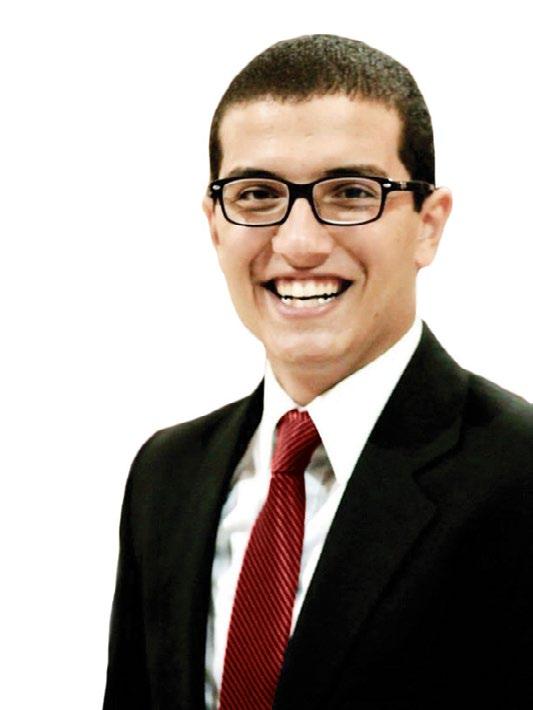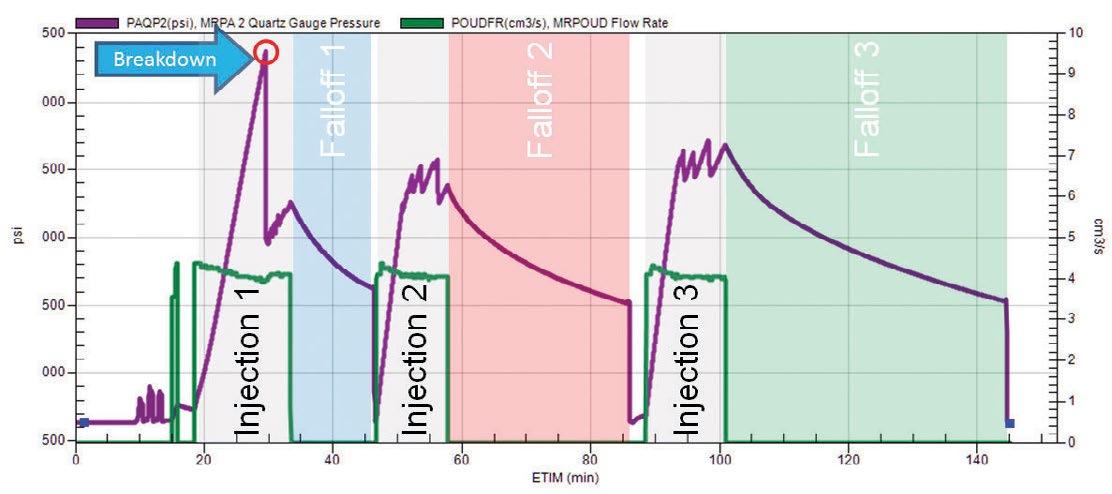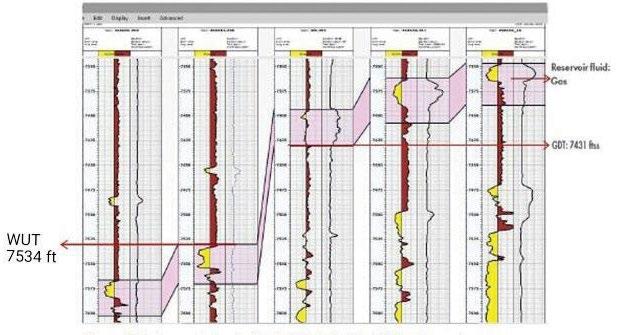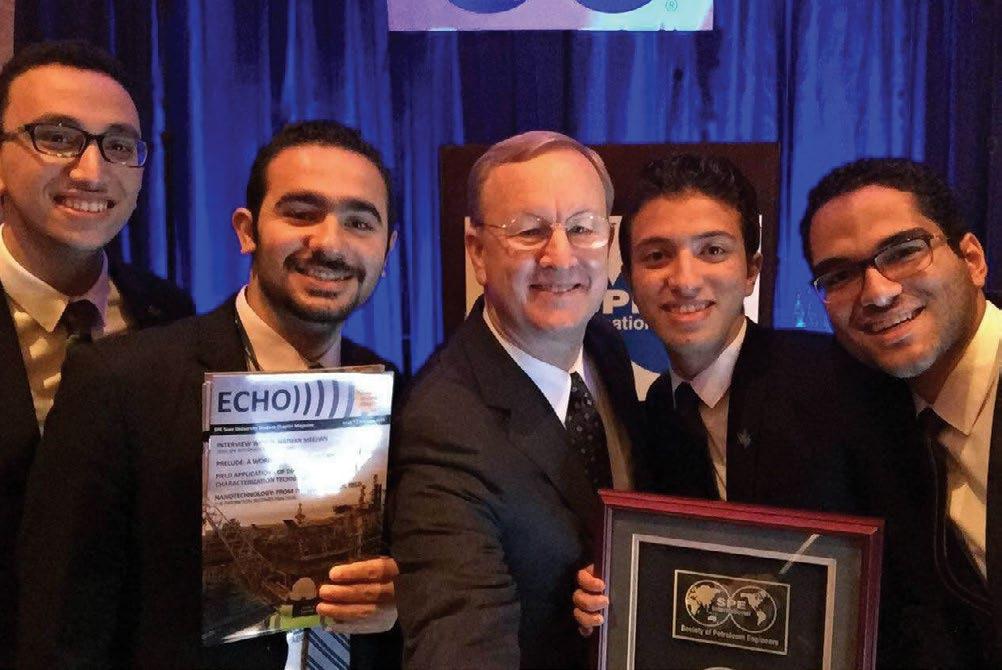
8 minute read
INTERVIEW
Interview with Ms. Janeen Judah 2017 SPE International President
By Mohamed Alaa Elkasaby and Abdelrahman Elhosany
Advertisement
Ms. Janeen Judah, I would like to congratulate you for being 2017 SPE President.
1. First of all, we would like to know about your unique journey at SPE, and how glorious is it to be one of the industry pioneers helping the world receive their daily energy needs? Petroleum engineers bring energy to the world. I don’t think American engineers truly appreciate the magnitude of what we do until we travel to other parts of the world that do not have cheap, widely available electricity and fuel. Travelling to rural Africa and India showed me what remains to be done. Even in the USA, universal energy is still a relatively recent development; electricity was not widely available in parts of rural Texas until after WWII, and the US natural gas pipeline system was built mostly in the 1960’s. Just as the Aswan Dam accelerated Egypt’s development through cheap electricity, development of new oil and gas resources will do the same for other parts of the world. Engineers make that happen.
Perseverance, endurance, and the ability to “roll with” changes in business. For example, I’ve consistently been involved with SPE regardless of my employer or supervisor, through good times and not so good times. I started as a student section officer at Texas A&M University. I moved to Midland after college & volunteered with the local section, starting with the Scholarship Committee. I moved up through offices of the Permian Basin Section, becoming Chairman at age of 29. I returned to Houston in 1990, and started the path again with the Scholarship Committee, and eventually, Chairman of the Gulf Coast Section in 2001. This is my third time on the international board, as I’ve served as the Regional Director for Gulf Coast North America, and Financial Vice President. I’ve been consistently involved with SPE throughout my career, both for my own development, and to give back to the profession of petroleum engineering.
3. As there is a global trend towards gender diversity in the oil and gas industry, how do you see the role of women in our industry? Gender equity issues are societal issues and not unique to the oil and gas industry. In my involvement with the Society
Janeen Judah is the General Manager for Chevron’s South African Business Unit. She currently serves on the SPE Board of Directors as Vice President of Finance. She has served as President of Chevron Environmental Management Company and General Manager of Reservoir and Production Engineering for Chevron Energy Technology Company. Also, she worked for Texaco and ARCO in various upstream petroleum engineering positions, starting in Midland in 1980. Judah holds BS and MS degrees in petroleum engineering from Texas A&M University, an MBA from The University of Texas of the Permian Basin, and a JD from the University of Houston Law Center. Judah will serve as 2017 President of Society of Petroleum Engineers.
of Women Engineers over the last several years, I’ve seen that gender issues extend across all engineering professions, and may extend even to non-industrial careers. The technological challenges we face in oil and gas require innovation and creative thinking, that’s why we can’t ignore half the brains in our society if we want to solve the big problems. Doing things the way we have always done it won’t cut it anymore. For unique aspects, I have special obligations as a woman president of a more than 90% male organization. I am the first woman president in 11 years, so the younger engineers hired in this last upturn have never seen a woman in the position. I know that women look to me as a role model, so I take a special effort to make myself visible to them, both in person and through social media. Follow me @JaneenJudah – I often tweet on career development issues. In my early career, gender bias was overt, but now is more subtle and unconscious. Women especially should let their supervisors know what opportunities they want – otherwise others can make assumptions and limit your options for you. I believe the most significant challenge for women
is not dealing with children, but rather with dual career issues, since our industry highly values mobility. However, the most important factor for career success is a sponsor – impress someone high up in your company with your ability to do a great job.
4. I know that you visited Egypt before. Can you share your experience in Egypt, and your impressions about the Egyptian culture with us? Egypt is the cradle of civilization, but nothing prepares you for seeing Giza for the first time. I’ve told many friends that Egypt is a place everyone must see at least once in their lifetime. Our trip to Egypt was for my 50 th birthday and I celebrated in the very hot Luxor! I look forward to returning to Egypt and seeing places that I missed on my first trip. I am an avid Scuba Diver and would like to dive in the Red Sea at Sharm El-Sheikh. I would also like to see Santa Chatherina monastery in Sinai and Bibliotheca Alexandria.
5. Referring to your life as a student, what were your professional career goals? And how did you plan to achieve these goals? I graduated with my masters’ degree in Petroleum Engineering at another low point in the industry – 1983. I was just happy to get a job. The first 20 years of my career were during hard times, so my usual annual goal was simply to increase my skills and stay employed. I didn’t have many grand career plans.
6. What about degrees and majors you hold, and how does these degrees help you in each stage of your career? I am naturally a lifelong learner, but the real reason for all my extra education was insurance. The first 20 years of my career were characterized by rounds of layoffs nearly every two years. So mostly, it was a time of decreasing opportunity. I had to keep my technical ability sharp and add to my bundle of skills just to stay employed. Sometimes, I do a presentation on Graduate School Options since I have graduate degrees in petroleum engineering, business and law. My usual recommendation (at least to US employees) is to get an MBA while they are working. We are in the oil business, and better understanding of business analysis and management is always useful.
still providing our excellent services to our members. Like everyone else, SPE is evaluating its portfolio of meetings and services, and we will make some adjustments both for the market and for technology advances.
8. How do you see the granted Outstanding Student Chapter Award for the second time in a row, what would you like to tell our Chapter’s members? Remember, I started my SPE career as a student section officer. The skills you learn in student section leadership will serve you well throughout your career: • Leading without authority • Volunteering work and networking • Public speaking I hope that all of you will stay involved in SPE and take on leadership roles in local sections.
9. How does SPE plan to support the oil and gas industry in its current drop down? The oil business is cyclical, just like almost every other business. As leaders, we need to encourage our employers to take a longer-term view, and use this downtime in investment to step back and analyze data for our fields.
10. In your opinion as a leader, how can the world collaborate to survive the current downturn in industry? If the past is a predictor of the future, then we have seen innovation come out of hard times, because we were forced to. The US Shale Revolution had its roots in the hard times of the late 1990’s. Hydraulic fracturing in shale was developed
out of necessity, not out of excess. Stepchange innovations in the oil industry have usually been developed during down cycles, and I look forward to seeing what will come out of this one.
11. What would you like to tell senior students who are frightened of graduation and are anxious about their career opportunities in the industry? We should remember that we didn’t bring new people into the industry, especially in the United States, for about 15 years starting in 1985. The industry is paying now, as the baby boomer generation is reaching retirement age. My advice is to look hard for a job and not be too concerned about landing your dream job – just get your foot on the ladder. The oil price will swing back up again, and the ‘baby boomer’ generation will retire, both of which will create new opportunities. If you can’t get a position now, consider adding skills through graduate school in business or computer sciences/information technology. The next big things are likely to be big data analytics and the internet of things. As we collect massive real-time data on our fields, we need people who can manage, interpret, and leverage it.
12. What do you think of ECHO Magazine as a student product by SPE Suez University Student Chapter? It’s a great outreach effort for both the university community and your alumni. It’s also an indication of persistent students who are mindful of their career goals and have wide aspirations and potentials. I wish you all ultimate success!
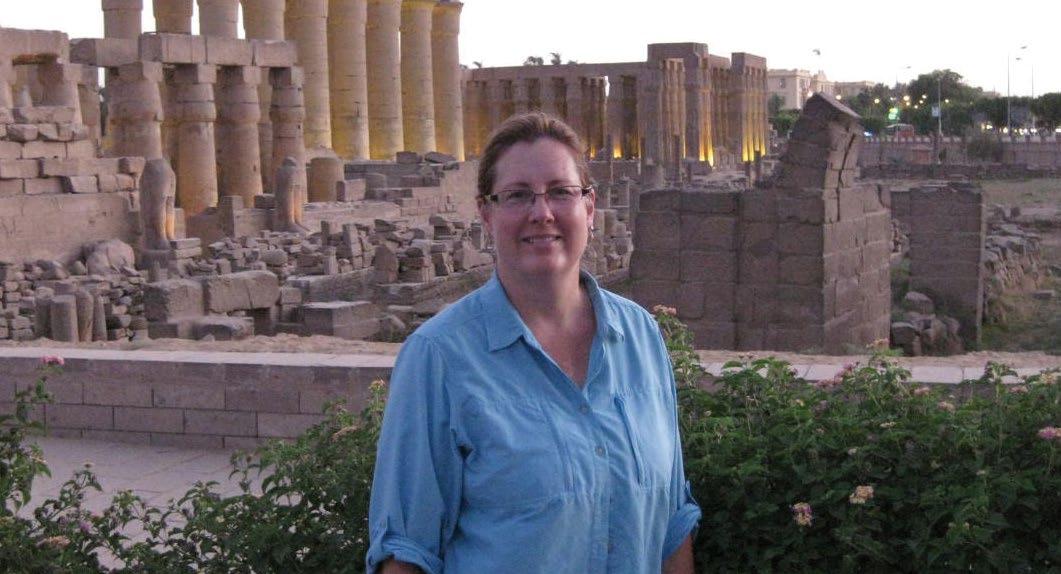
7. Could you share your aspiration for SPE this season with our readers? The most important responsibility for me in my tenure will be to help SPE navigate the rough waters of this downturn, while Ms. Janeen Judah During Her Visit to Luxor in Her 50 th Birthday

